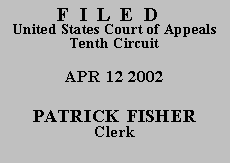

| UNITED STATES OF AMERICA,
v.
MICHAEL A. COOK |
(D.Ct. Nos. 01-CV-3066-JWL, 98-CR-20040-JWL) |
ORDER AND JUDGMENT(*)
Before BARRETT, PORFILIO, and
BRORBY, Senior Circuit Judges.
After examining the briefs and appellate record, this panel has determined
unanimously that oral argument would not materially assist the determination of
this appeal. See Fed. R. App. P. 34(a)(2); 10th Cir. R. 34.1(G). The case is
therefore ordered submitted without oral argument.
Michael Cook, a federal prisoner proceeding pro se, appeals the district court's decision dismissing his motion to vacate, set aside, or correct his sentence under 28 U.S.C. § 2255. In doing so, Mr. Cook seeks a certificate of appealability to appeal the district court's denial of his § 2255 motion. We deny Mr. Cook's application for a certificate of appealability and dismiss his appeal.
A jury convicted Mr. Cook of "possessing with intent to distribute more than 1500 grams of methamphetamine and aiding and abetting in violation of 21 U.S.C. § 841(a)(1) and 18 U.S.C. § 2, and possessing a firearm and ammunition as a convicted felon in violation of 18 U.S.C. § 922(g)(1)." United States v. Cook, 1999 WL 1244476, at *1 (10th Cir. Dec. 20, 1999). He was sentenced to 293 months imprisonment and five years of supervised release. Id. On direct appeal, Mr. Cook's sole argument was the evidence was insufficient to support his conviction. Id. at 4. We affirmed the conviction. Id. Mr. Cook then sought habeas relief under 28 U.S.C. § 2255 arguing, among other things, his sentence violated his due process rights as described in Apprendi v. New Jersey, 530 U.S. 466 (2000). Cook v. United States, 2001 WL 950795, at *1 (D. Kan. Aug. 6, 2001). The district court found Mr. Cook's Apprendi argument was barred because it had not been raised at trial or on direct appeal. Id., at **1-2. Moreover, the district court concluded, even if the Apprendi argument was not barred, the rule in Apprendi would not apply retroactively to Mr. Cook's sentence. Id. at *2.
In requesting a certificate of appealability, Mr. Cook renews his Apprendi argument. Specifically Mr. Cook argues he was sentenced for drug quantities that were not charged in the indictment or submitted to the jury.
Because Mr. Cook did not raise the Apprendi argument at trial or on appeal, see Cook, 1999 WL 1244476, at *1; United States v. Cook, 1999 WL 155964, at *3 (D. Kan. Jan. 4, 1999), he "is barred from raising the issue in a § 2255 motion, unless he can show cause for his procedural default and actual prejudice resulting from the alleged errors, or can show that a fundamental miscarriage of justice will occur if his claim is not addressed." United States v. Talk, 158 F.3d 1064, 1067 (10th Cir. 1998) (quotation marks and citation omitted), cert. denied, 525 U.S. 1164 (1999).
Mr. Cook's petition does not reveal the "cause" or reason he failed to raise his Apprendi argument at trial or on direct appeal. Thus, like the district court, we assume the sole reason Mr. Cook did not raise the argument was Apprendi had not been decided yet. Cook, 2001 WL 950795, at *1. The Supreme Court has held "cause" is not satisfied if the petitioner's sole argument is "'that a claim was "unacceptable to that particular court at that particular time."'" Bousley v. United States, 523 U.S. 614, 623 (1998) (quoting Engle v. Isaac, 456 U.S. 107, 130 n.35 (1982)). As Mr. Cook acknowledges in his petition, support for his claim could be found in In re Winship, 397 U.S. 358, 364 (1970), which had been decided at the time of his trial. Thus, Mr. Cook has not established cause sufficient to excuse his procedural default.
Similarly, Mr. Cook's petition does not assert a "fundamental miscarriage" of justice will occur unless we address his claim. Mr. Cook never argues he is actually innocent. See United States v. Cox, 83 F.3d 336, 341 (10th Cir. 1996) (holding "because [petitioner] has not made a colorable showing of factual innocence, he cannot establish a fundamental miscarriage of justice"). Consequently, his Apprendi argument is barred and we need not address the merits of his claim.
For these reasons, we deny Mr. Cook's motion for a certificate of appealability and DISMISS his appeal.
Entered by the Court:
WADE BRORBY
United States Circuit Judge
*. This order and judgment is not binding precedent except under the doctrines of law of the case, res judicata and collateral estoppel. The court generally disfavors the citation of orders and judgments; nevertheless, an order and judgment may be cited under the terms and conditions of 10th Cir. R. 36.3.